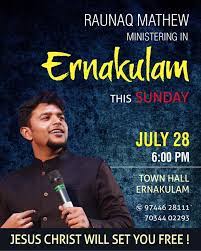Small Gods
“Do you know who my Jesus is?
He is money. Jesus is money. Do you want money? Send your bank account number
to …”
Frenzied
people take out their smartphones and…
Brother
Raunaq Mathew holds them in thrall. He is one of the many new
gen religious cult leaders in Kerala today. There are many like him now. Their
only motive is making money. Make money by the Holy Spirit or by the unholy
apps.
I am
astounded by the number of followers that these frauds gather even in Kerala.
Kerala claims to be the land of enlightened people; Prabuddha Keralam is
what it calls itself. But I find the people here as beguiled as those anywhere else
in India.
Long ago
Swami Vivekananda [whom Prime Minister Modi once called Vivek Munda] called
Kerala a lunatic asylum because of the inhuman casteism that prevailed in the
state. Kerala was rather quick to cure itself of that lunacy. But soon other
lunacies replaced it. The latest is a bunch of Christian cults.
Pastor M A Varughese is
an icon among these frauds. He tells his followers that he does not require
their alms. He is not a beggar, he says. He is a God’s representative.
Shouldn’t you give your all to God? “When I took over a church in 1983, the
offertory received was Rs 7.45,” he told a gathering of his followers recently.
He went on to tell the idiotic followers that today he receives so much money
by offertory that his five counting machines cannot manage it. The point he
wanted to make was that the followers should not donate small amounts. “Give clean
big notes.” After all, Modi ji has given us Rs2000-bills. “My counting machine
says that we don’t need alms,” Pastor Varughese declared to his followers
arrogantly.
Why do people
choose to deceive themselves?
My
understanding is that people want to experience a feeling of belonging. Most of
us love to belong to a group which will ensure our safety one way or another.
Bags of rice to start with. That is what the Sangh Parivar alleges, at least. It’s
much more than that, I’m sure. A sense of belonging which you get when you
throw a few Rs-2000 notes into the offertory is quite exquisite, especially
when your generosity is watched and appreciated by a sizeable number of people.
If religion
meant more than the small pleasures like the sense of belonging, ours would
have been quite a nice place. Small gods are good enough for us, I guess.

Hari Om
ReplyDeleteI too question the constant request for funds (however it is begged - or ordered); I have seen the ostentatiousness of 'giving' and the fretting of those who have not the funds, yet give still... that which is sought is free - for all who are open to receiving it. YAM xx
Indeed, grace is free. But that's just what the believers don't want, it seems.
Delete